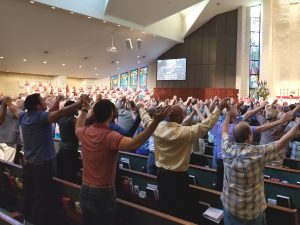
Core values are an essential part of organizational DNA. They tell the story of what is important within a given church, non-profit organization, or for profit business. And, core values should guide all that an organization is and does.
Since core values are so significant they should be named often, and embodied always. Two faith-based organizations that I know well serve as good examples.
Cathedral of Hope United Church of Christ
We believe we are here to serve, not to be served. To that end, we embrace five core values.
- We are a people of Compassion. We are ministers who embody the tangible love of a savior who fed the hungry, healed the hurting, and told us bluntly that what we did to the least we did to him.
- We are a people of Inclusion. This is a value Jesus held. We believe Jesus came to include, not to exclude. All are welcome around God’s table.
- We are a people of Liberation. We seek to challenge all oppression, particularly the oppression of queer people. By embodying grace we live out our liberation until all are set free.
- We are a people of Hope. We are people filled with joy and unrelenting optimism because we believe God is good. With God, all things are possible. God can use us to transform the world.
- We are a people of Jesus. We believe Jesus was the incarnation of God’s grace. Jesus was the ultimate liberal, who resisted the status quo of oppression and showed us the way to the abundant life God intends for all people.
Mansfield Mission Center
We share five core values:
- Christ-centered. Our love for Jesus motivates our work and centers our purpose.
- Relational. We cultivate supportive networks of community members, volunteers and staff.
- Community-serving. We are responsive to the needs of the community and recognize the importance of partnership with churches and other agencies to attain the greatest impact.
- Compassionate. We care deeply about those we serve, including clients, customers, volunteers and staff, and we are responsive to their unique situations.
- Stewards. We do our best to maximize donations and nurture the people entrusted to us.
So What?
These statements come from the organizations’ websites. They can also be found in printed materials, and are readily accessible to newcomers and long time supporters.
Both organizations, however, go beyond merely placing information in key locations.
Cathedral of Hope UCC is currently celebrating 48 years of ministry. Through many transitions, this community of faith has moved forward guided by its core values. As a part of their anniversary month, the congregation is affirming its core values in every service of worship using a statement written many years ago:
One: At the Cathedral of Hope, every member is a minister of the church. We believe we are here to serve, not to be served. To that end, we embrace these five core values: We value Compassion. We embody the tangible love of a Savior who fed the hungry, healed the hurting, and told us that what we did to the least we did to him.
All: We are a people of Compassion.
One: We believe Inclusion was a value Jesus held. Jesus came to include, not to exclude. All are welcome around God’s table.
All: We are a people of Inclusion.
One: As people who embrace Liberation, we seek to challenge all oppression. By embodying grace we live out our liberation until all are set free.
All: We are a people of Liberation.
One: Amid the negatives of this world, we believe in Hope. We are people filled with joy and unrelenting optimism because we believe God is good. With God, all things are possible. God can use us to transform the world.
All: We are a people of Hope.
One: Finally, as a congregation seeking to reclaim the Christ of Christianity, we believe Jesus was the incarnation of God’s grace. Jesus was the ultimate radical, who resisted the status quo of oppression and showed us the way to the abundant life God intends for all people.
All: We are a people of Jesus.
The Wesley Mission Center recently became the Mansfield Mission Center. The shift in names was a natural part of the organization’s continued growth and commitment to serve the whole community. The core values did not change. Instead, they enabled this transition. And, since the organization is growing rapidly leaders are committed to sharing the core values with all stakeholders. New volunteers learn about them as part of an orientation experience, employees are exploring them in-depth during staff meetings, and supporters regularly reconnect with them through multiple communication channels.
With these examples in mind, I invite you to think of your congregation or community of faith and a faith-based non-profit you support. For each organization answer the following questions:
- How quickly is a newcomer likely to hear our core values verbalized? What, if any, inconsistencies might a newcomer perceive between our stated core values and the ministry and mission of our organization?
- On a scale of 1 to 10 how do I rate the organization’s current commitment to our core values? What is one thing I can do to that shows my focus our core values?